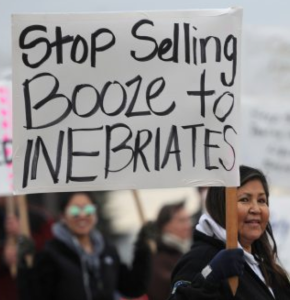 Click on the photo to check out the most recent Victorian episode in the Raj — I mean Anchorage, Alaska. “Come now!”, you say, every civilized society frowns on the sale of intoxicants to the intoxicated. That may well be the case, but it is NOT what is in issue here.
Click on the photo to check out the most recent Victorian episode in the Raj — I mean Anchorage, Alaska. “Come now!”, you say, every civilized society frowns on the sale of intoxicants to the intoxicated. That may well be the case, but it is NOT what is in issue here.
From the ADN article:
Thompson said she took steps and spent money to comply with the council’s requests.
“They asked us to upgrade our security camera system. We did that. They asked me to work with (APD officer Sally Jones) to come up with ideas for better lighting, so we did that,” she said.
At the same time, starting in October 2013, Anchorage police were gathering surveillance footage of Spirits of Alaska to document the kind of behavior residents were complaining about.
They edited the footage into a kind of supercut that shows, condensed, what Gilliam says is the problem: “Apparent drug deals. Assaults. Straw purchases — where individuals buy alcohol and sell it to drunk individuals. An allegation that one clerk is working in conjunction with a known drug dealer … People have difficulty getting up. People standing on corner drinking. Female employee leaving with a known drug dealer. Guy smoking crack. Public defecation on south side of building …” he said.
Gilliam says it is clear to him that Spirits of Alaska is selling largely to street alcoholics.
In other words, as was the case with the hysteria promoted by the “liberal” East side Assemblyman, Paul Honeman, this is not about stopping the sale of alcohol to the inebriated, but about stopping the sale of alcohol to people who drink. I understand that there may be some of my readers, as few as you are, who cannot fathom the difference; this is for you.
Anchorage is aflame! We have public drunks! And the bright lights of Anchorage, living as they do in the seat of universal logic, have determined that the best way to rid the community of public drunks, is to shut down liquor stores that sell booze to the poor, unimportant, people. Think of it as a modern day equivalent to Henry Anslinger‘s 1930’s attempts to stop crime in its tracks by shutting down the Negro scourges of jazz and marijuana (oh, wait, that was before we became a “post-racial” society, so that was OK!) Apparently either rich important people aren’t drunks (well, we know THAT’S not the case) or we don’t care that you are driving around looped to the gills, as long as we don’t see you (and please watch out for those little bundles of flowers along side the roads). And therein lies our tale. But I am getting ahead of myself.
DRUGS! BENGHAZI! DRUGS! I mean, associating with a known drug dealer! THAT is certainly not Constitutionally protected! But what about consuming an intoxicant while not intoxicated in a public place? Well THAT is unlawful AMC 8.35.400, and THAT is not the responsibility of the Alcohol Beverage Control Board; that is the responsibility of the very same Anchorage Police Department that has been the target of attacks by the Mayor and is seriously undermanned and underfunded. So what have the Assembly done? Of course, they gave them more to do – now they have to write $100 tickets for public pot smoking (of COURSE they still need pot sniffing dogs!) As one can see from reviewing Anchorage’s alcohol ordinances, the licensee is NOT responsible for any conduct off the licensed premises, and is subject to a very clear standard of care. Nor is there anything in the story which suggests that the licensee has not met her duty.
These efforts are cut from the same cloth as Honeman’s past efforts, which were based upon the premises that as homeless people rarely have ID in their possession, requiring people to show ID would keep homeless people from buying booze. I argued it was an indirect attack that could not stand constitutional scrutiny; the local ACLU was fine with it (apparently the ACLU folk did not want scruffy street people living near their homes… Go figure.) In other words, if we don’t want dogs in town, we raise the price of dog feed to $500/bag and require that the feed be purchased by someone wearing $1000 pumps — problem solved because now, though we still have dogs, the dogs are well groomed.
So, let me ask you, Ms. Demoski, if I publicly urinate in front of your house, are you going to organize a protest to make water fountains illegal? If I think you are a bit overweight, should I raise the price of food at all the stores you can shop at?

 I will certainly admit to the fact that countless children escape an education, but qualify that confession with the observation that the wee toads are aided and abetted by their parents, who are of legal age, if not necessarily of sound mind, and whom, if the truth be told, are hustling their precious little devils through those cracks as quickly as their little chubby legs can carry them. And while some of us see down the rabbit hole as delightful interlude from the humdrum of our obligations, for some the illusion becomes all too real
I will certainly admit to the fact that countless children escape an education, but qualify that confession with the observation that the wee toads are aided and abetted by their parents, who are of legal age, if not necessarily of sound mind, and whom, if the truth be told, are hustling their precious little devils through those cracks as quickly as their little chubby legs can carry them. And while some of us see down the rabbit hole as delightful interlude from the humdrum of our obligations, for some the illusion becomes all too real the State wide marijuana initiative which required that Alaska regulate marijuana like alcohol. Her campaign resulted in the appearance of some rather tacky graphics (an example appears to the left) and quite a bit of outrage (except from the supposedly “liberal” East side ex-cop, who is of course not liberal at all, except perhaps in Anchorage, where axe-murderers might be described as local celebrities.) The measure failed 9-2 and demonstrated that Amy has the pulse of the people (the State-wide measure passed in Anchorage by a very impressive margin) and knows when she has support so as not to waste the time of the public or the Assembly.
the State wide marijuana initiative which required that Alaska regulate marijuana like alcohol. Her campaign resulted in the appearance of some rather tacky graphics (an example appears to the left) and quite a bit of outrage (except from the supposedly “liberal” East side ex-cop, who is of course not liberal at all, except perhaps in Anchorage, where axe-murderers might be described as local celebrities.) The measure failed 9-2 and demonstrated that Amy has the pulse of the people (the State-wide measure passed in Anchorage by a very impressive margin) and knows when she has support so as not to waste the time of the public or the Assembly. I was overwhelmed with this guys spirit, but being very Jewish and not a little under the weather, I realized that my mastery of Clement Clarke Moore was as shady as his claim of authorship — I could not recite the necessary lines! I stumbled over Comet and Dancer, and catching my lady friend’s dirty looks I chirped Vixen and Cupid. Uhhhh, Blintzes (“I mean Blitzen, Officer”). And I was done. I mean I was done, my goose was cooked. I could see the officer getting irritated (he would have to stay long after his shift doing paperwork on an ingrate) and I would be lucky if my girlfriend had two words for me. Stick me with a fork.
I was overwhelmed with this guys spirit, but being very Jewish and not a little under the weather, I realized that my mastery of Clement Clarke Moore was as shady as his claim of authorship — I could not recite the necessary lines! I stumbled over Comet and Dancer, and catching my lady friend’s dirty looks I chirped Vixen and Cupid. Uhhhh, Blintzes (“I mean Blitzen, Officer”). And I was done. I mean I was done, my goose was cooked. I could see the officer getting irritated (he would have to stay long after his shift doing paperwork on an ingrate) and I would be lucky if my girlfriend had two words for me. Stick me with a fork.


 the top military official of the Bush Administration is no where to be seen. Hmmmph…..
the top military official of the Bush Administration is no where to be seen. Hmmmph…..